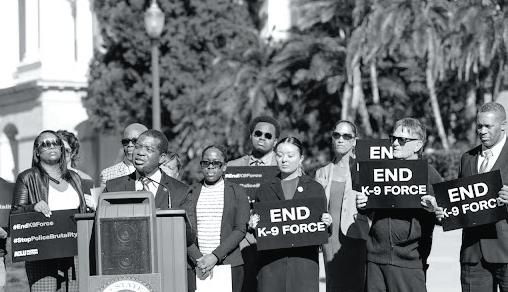
2 minute read
New Assembly Bill Would Ban Use of Police Canines for Arrests
By Edward Henderson California Black Media
Last week, Assemblymember Corey A. Jackson (D-Riverside) introduced Assembly Bill (AB) 742, legislation that would prohibit the use of police canines for arrests, apprehensions and crowd control.
The use of police canines, supporters of the legislation say, is a throwback to the darkest days of legal slavery, Jim Crow segregation –and a reminder of America’s history of racial bias, aggression and violence against Blacks and people of color. Jackson says he wants to end the “deeply racialized, traumatic and harmful practice.”
“Since their inception, police canines have been used to inflict brutal violence and lifelong trauma on Black Americans and communities of color,” said Jackson at a press conference held to announce the bill. “It’s time to end this cruel and inhumane practice and instead work towards building trust between the police and the communities they serve.”
The American Civil Liberties Union (ACLU) California Action, a co-sponsor of AB 742, echoed Jackson’s concerns. “The use of police canines has severe and potentially deadly consequences for bite victims, especially communities of color,” said Carlos Marquez III, Executive Director of ACLU California Action. “It’s time for California to take a stand and end this inhumane practice.”
Jackson says his stance on the use of canines in law enforcement is backed up by data. For him, it’s a “moral issue” as well.
“I let the data take me to where I need to go. And the data is clear that in some of the most consequential issues of our time right now – especially when it comes to the relationship between law enforcement and the African American community,” Jackson told California Black Media (CBM). “This was a no brainer for me. This is not a gotcha bill. Our own data in California shows that we have it wrong, and we have to fix it.”
“The fact that canines are harming people more than batons and tasers is astonishing to me. I would never have guessed that” added Jackson, who says he has already read three reports on the topic.
AB 742 does not call for banning the use of police canines for search and rescue, explosives detection, and narcotics detection – all activities that do not involve biting.
“The use of a canine is sending a dog out that will inflict injury on a person before that person has been accused of a crime or formally convicted of one,” said Kat Carell, a member of the Sacramento Chapter of the ACLU. “So, you end up with lifelong disfigurement, or mental problems, or you could be killed before you have ever been in a court of law and proven guilty of anything.”
Reaction to the introduction of the bill by police dog handlers and some law enforcement organizations -- including the Western States Canine Association -- was swift, char- acterizing the bill as misguided and going too far.
Ron Cloward, President for the Western States Police Canine Association and a veteran of the Modesto Police Department, said Jackson’s bill does not “make sense.” He argued that if AB 742 passes, it would take away one more non-lethal weapon law enforcement relies on to fight crime.
Cloward, who owns a canine training business, told ABC news affiliate in Bakersfield that while dog bites can be harmful and “disfiguring,” they do not cause death.
“Once you’ve deployed pepper spray, it’s been deployed. It’s gonna land. Once you use your gun, it’s gone,” he said. “Once you use a taser, it’s on its way. You’re not stopping it. The only thing you can stop is a K-9.”
Jackson was elected in November of 2022 to represent the 60th Assembly District. Before that, he served on the Riverside County Board of Education in 2020 and represented portions of the cities of Riverside, Moreno Valley, Perris, and the unincorporated community of Mead Valley.
Supporters say Jackson’s background in social work gives him a keen awareness and understanding of the microaggressions Black and Brown communities face.
AB 742 is one of many pieces of legislation Jackson has introduced (or plans to) that holds individuals and institutions accountable, creating room for even larger victories towards dismantling systematic racism. He calls the effort the ‘Antiracism Bill Package.’









